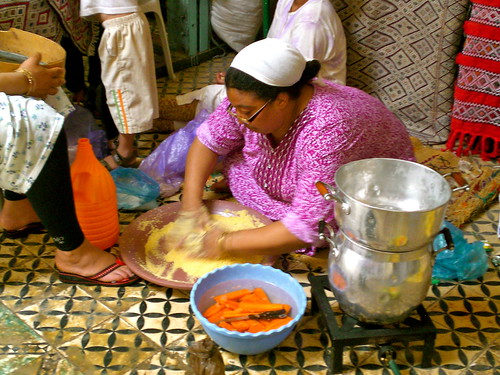Khadija Oujkak is the solid foundation of the Cooperative des Tisseuses d’Ain Leuh. Although her official title is Treasurer, her unofficial titles include project manager, teacher of apprentices, wool purchaser, volunteer coordinator, director of marketing and pricing, cooperative spokeswoman, and of course, master weaver.
In addition to her full time work at the cooperative, Khadija is married and has two children. This translates into daily cooking a full lunch and dinner, scrubbing down the bathroom, washing clothes by hand, shopping for food at the market, and keeping her kids in line.
Living in rural poverty, Khadija has faced a number of hardships throughout her life. A misplaced shot in the hip during her childhood has rendered walking difficult for Khadija. She dropped out of school when she was 10 years old because walking to school everyday was impossible. Today, even with a full leg brace and cane, and it’s a daily physical challenge to climb the steep steps from her home near the bottom of town to work at the cooperative.
When her 2-year-old son fell ill with a fever, she took him to see the only doctor in Ain Leuh. After the medication he prescribed did not work, she tried numerous traditional remedies to break his fever. She ground herbs to spread on his chest and forehead and cooled his skin with rosewater. After his health did not improve, she took back to the doctor. She was referred to the hospital in Azrou, 30 kilometers away. She had to wait too long to see a doctor at the overcrowded and inefficient public hospital there, which services not only the large town of Azrou, but is also the only available hospital to many small and rural villages. Affordable transportation from town to town can take hours, and when she was finally referred to the larger, better outfitted hospital in Meknes, her son died in her arms on the way.
Listening to experiences like these have led me to a new understanding of what it means to be poor and uneducated in rural Morocco. It is more than just not being able to read, it is more than poor nutrition. It is the loss of human dignity, the want of basic rights, and the lack of hope for the future.
Khadija does not lack hope. She is a strong woman, and is warm and generous with her time and affection. She commits everything she has to work at the cooperative. She has brought the number of full-time women at the cooperative from 7, when she took over as treasurer, to fifteen. She is skilled at networking, using her personal warmth and passion for her work to help further the business of the cooperative. For her, weaving is life itself, and it shows in her commitment to the cooperative and in the beauty of her weavings.
Posted By Laura McAdams
Posted Jul 20th, 2012



